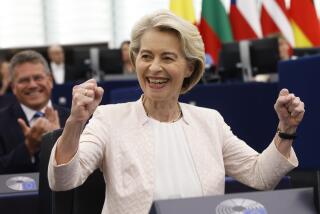5 New Members Elected to U.N. Security Council
- Share via
UNITED NATIONS — After months of intense campaigning, broken promises and possible dirty tricks, the General Assembly elected five new nonpermanent members to the 15-seat Security Council on Tuesday. Colombia, Ireland and Singapore had easy victories, but it took four rounds of voting for Mauritius and Norway to win their seats.
The U.S. helped tiny Mauritius win a place on the council by blocking Sudan’s bid for the African seat, and Norway finally defeated Italy for a European seat. The five countries will succeed outgoing members Argentina, Canada, Malaysia, Namibia and the Netherlands, whose two-year terms end this year.
The annual election for the rotating seats offers a chance for small countries to add their voices to the five permanent “Big Boys”: the United States, Britain, Russia, China and France. Usually, each region decides on a representative before the election to assume the influential spot--Colombia and Singapore took their places through consensus. But the race for the European and African seats was particularly close this year.
The U.S. led a campaign against Sudan, the leading candidate from Africa, saying that a country under U.N. sanctions with a poor human rights record had no place on the prestigious council.
The council authorized sanctions against Sudan in 1996 for its suspected role in an assassination attempt against Egyptian President Hosni Mubarak in Ethiopia the year before. Washington also bombed a manufacturing plant in Sudan with cruise missiles in 1998, accusing the government of producing chemical weapons and backing Saudi militant Osama bin Laden.
U.S. Ambassador Richard Holbrooke said Tuesday that Sudan had offered him a deal: It would withdraw its Security Council candidacy if Washington worked to repeal the U.N. sanctions against the country. Holbrooke said he rejected the offer and that Sudan’s persistence would cost it Washington’s support for the lifting of sanctions, which was expected later this year.
But Mauritius’ victory was not an easy one. Sudan held the votes of most African nations until U.S. pressure led Uganda, then others, to break ranks during four rounds of voting.
Sudanese Ambassador Elfatih Mohammed Ahmed Erwa said he was proud that Sudan lasted four rounds against the U.S., and he criticized Washington’s interference.
“The influence of the U.S. in this election was very clear. We consider that we were fighting against the United States and not Mauritius,” he said. “We stayed to the end against the superpower. We are not the loser.”
The campaign for the European seat was fierce. Norway increased its budget for foreign assistance by $170 million, to $1.3 billion, just before the election and capped its efforts with a lavish reception hosted by King Harald V.
The Irish emphasized their history as a poor former colony to convince developing nations that it understands their needs, and sent an envoy to the South Pacific to garner the support of “fellow” small island nations.
The Italians came late to the race but are considered masters of U.N. diplomatic persuasion. Their representatives wined and dined ambassadors, held daily strategy meetings and offered aid and study scholarships to developing countries in the run-up to the election.
Their rivals claim they even resorted to undiplomatic behavior. Members of the Norwegian contingent say they had to guard their campaign materials during the U.N.’s Millennium Summit in September because they spotted competitors walking off with stacks.
As always, there were broken promises. Although ambassadors often pledge their votes to one country, sometimes even in writing, the ballot is secret and they can change their vote without anyone knowing.
Norwegian Ambassador Ole Peter Kolby thought his country had more than enough support. But Norway failed to win the required majority of 115 votes right away, and Kolby watched the number waver round by round before exactly 115 was reached.
For the U.N.’s smallest countries, the election is a brief moment in the spotlight.
“This is the most attention we’ve gotten for a long time,” said Alfred Carlot, acting ambassador for Vanuatu, population 240,000. Emissaries from both Italy and Norway visited the South Pacific nation to campaign, and Ireland formalized diplomatic relations in September. “Now that we’ve voted them in, maybe we won’t see them again for a while.”
More to Read
Sign up for Essential California
The most important California stories and recommendations in your inbox every morning.
You may occasionally receive promotional content from the Los Angeles Times.













